Unit 8 Detective stories period 3 Reading(2)(共20张PPT,含音频)
文档属性
| 名称 | Unit 8 Detective stories period 3 Reading(2)(共20张PPT,含音频) |
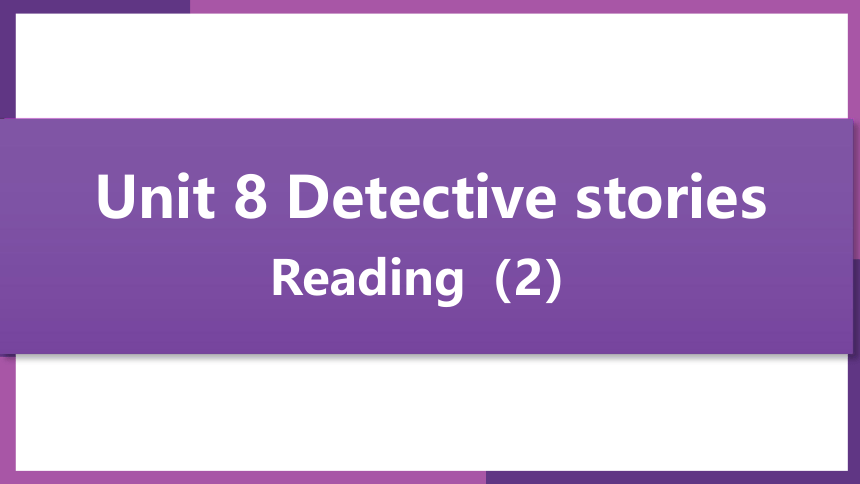
|
|
| 格式 | zip | ||
| 文件大小 | 172.8KB | ||
| 资源类型 | 教案 | ||
| 版本资源 | 牛津译林版 | ||
| 科目 | 英语 | ||
| 更新时间 | 2022-06-06 20:49:52 | ||
图片预览

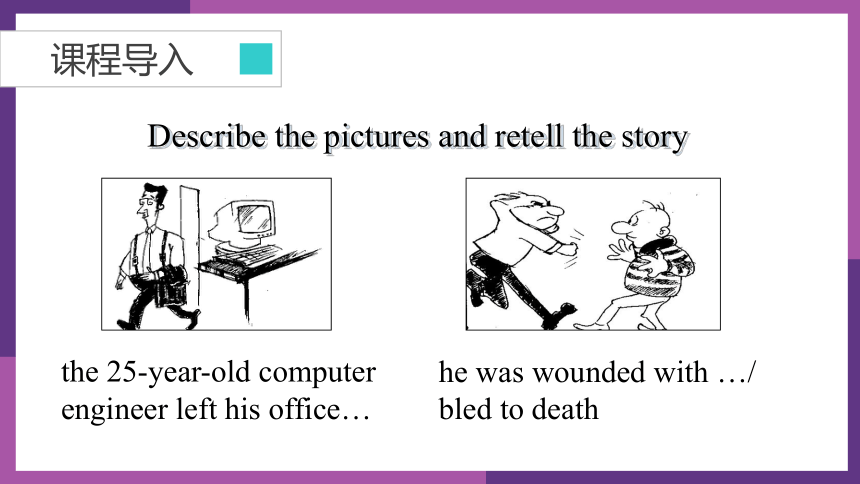
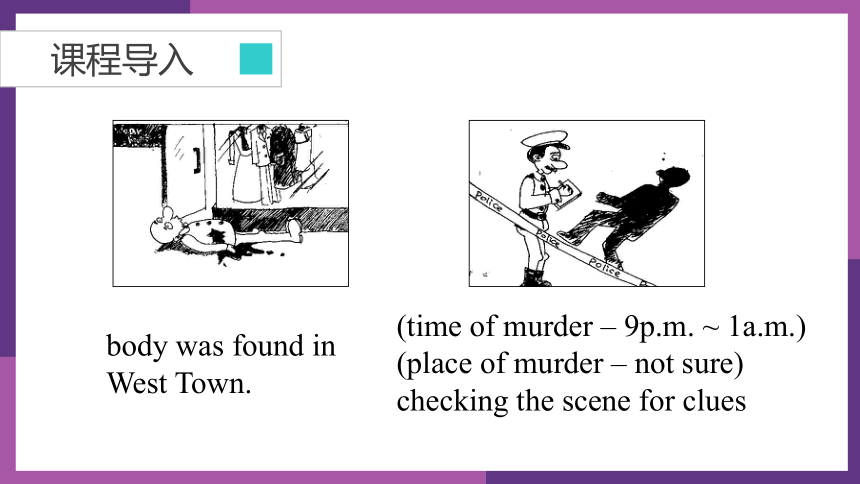
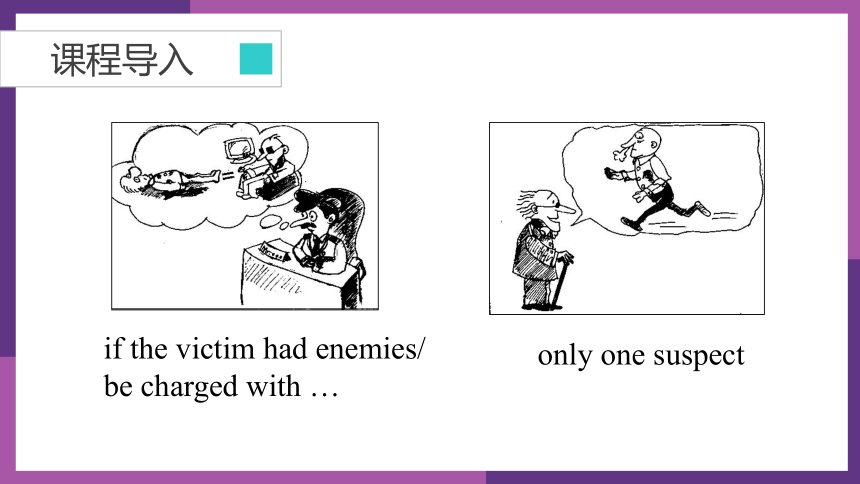


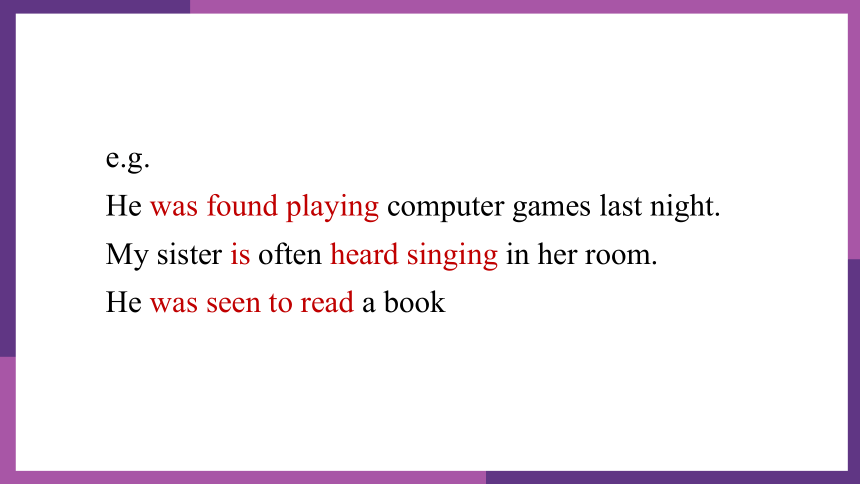

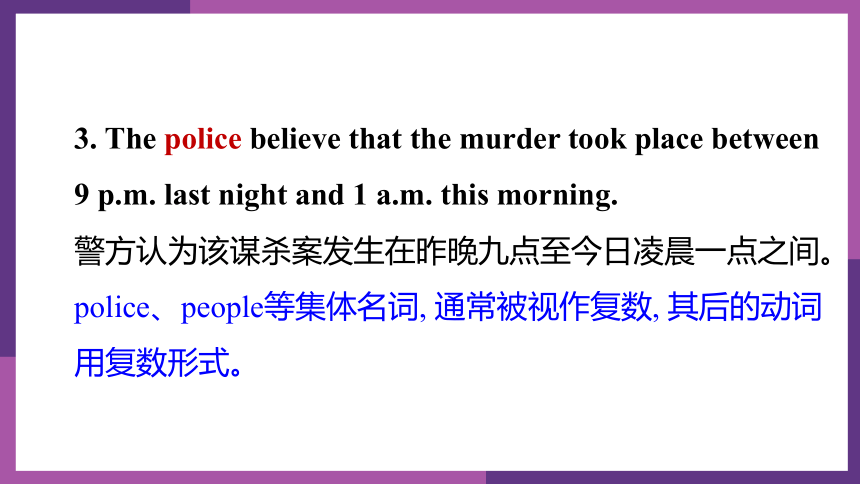
文档简介
(共20张PPT)
Unit 8 Detective stories
Reading(2)
课程导入
Describe the pictures and retell the story
the 25-year-old computer engineer left his office…
he was wounded with …/ bled to death
课程导入
if the victim had enemies/ be charged with …
(time of murder – 9p.m. ~ 1a.m.)
(place of murder – not sure)
checking the scene for clues
body was found in West Town.
课程导入
if the victim had enemies/ be charged with …
only one suspect
课程导入
offered a reward of…
1. He was last seen leaving his office in East Town at about 7 p.m. yesterday.
昨晚大约7点在东城有人最后一次看见他离开办公室。
sb. be seen doing/see sb. Doing看见正在做( 动作正在进行)
be seen to do 看见做了...(看见的动作已经完成)
看见某人正在干某事(强调动作正在进行)
watch, find, hear等均有此用法。
Language points
e.g.
He was found playing computer games last night.
My sister is often heard singing in her room.
He was seen to read a book
2. He said he was going to visit his parents.
他说他将要去看望他的父母。
were/was going to + 动词原形是过去将来时结构, 其形式还有would + 动词原形。表示从过去的某时间看将要发生的动作或存在的状态(也可以说是“过去的将来”) 。
e.g. Li Ming said that he was going to play football in the afternoon.
3. The police believe that the murder took place between 9 p.m. last night and 1 a.m. this morning.
警方认为该谋杀案发生在昨晚九点至今日凌晨一点之间。
police、people等集体名词, 通常被视作复数, 其后的动词用复数形式。
4. They are still working at the scene of the crime to find out whether the victim was killed somewhere else and then brought to West Town, or killed at the place where he was found.
他们还在犯罪现场研究受害人是在别处被杀后带到西城, 还是在他被发现的地方被杀。
whether ... or ... 意为“是……还是……”, 可用于宾语从句、状语从句、表语从句、同位语从句或主语从句等。
e.g. He does not care whether he wins or loses.
他不在乎他是赢还是输。
whether...or not 表示“不管是否......”, 既可放在句首, 也可放在句尾。
e.g. Whether you believe it or not, it’s true.
无论你是否相信, 这都是真的。
somewhere adv. 在某处; 到某处, 常用于肯定句中。如果期望对方给予肯定回答时, 它也可以用于疑问句中。
e.g. Jack must be playing somewhere on the playground.
杰克一定是在操场的某个地方玩耍。
5. The victim was wounded with a knife and bled to death as a result.
那位受害人被刀所伤, 因失血过多而死。
wound vt. 使…..受伤
e.g. The thief wounded her in the arm with his knife.
小偷用刀子扎伤了她的手臂。
n. 创伤; 伤害; 伤口 the wounded 伤员
6. He was charged with breaking into several computer systems over the last year.
他被指控在去年一年中闯入数个电脑系统。
charge sb. with ... 控告某人犯有(某种罪行)
e.g. The police charged him with theft.
警方指控他犯盗窃罪。
break into 强行闯入, 非法进入
e.g. Thieves broke into the house last night and stole some money.
昨晚小偷们闯进房子, 偷走了一些钱。
突然开始(大笑、唱歌等), 一下子……
e.g. Hearing the news, she broke into tears.
听到这个消息, 她突然哭了起来。
7. We suppose that the victim knew his murderer.
我们推测受害人认识杀害他的人。
suppose vt. 猜想, 假定, 料想; 认为常跟动词不定式的复合结构或从句。
I suppose him to be on duty.
我想他在值班。
Many people suppose (that) Mr. White has gone to America.
许多人都认为怀特先生已经去了美国。
suppose常用于be supposed to结构, 该结构的意思有两种: 一为“应该, 理应”,其否定形式为be not supposed to; 二为 “大家(都)认为”。
e.g. We are not supposed to smoke here.
我们不应该在这儿吸烟。
Lu Xun is supposed to be a great writer.
大家都认为鲁迅是一位伟大的作家。
课堂练习
1. The girl was often seen ____ here.
A. reading B. read
C. to read D. reads
2. The boy was heard _____ at 10 p.m. last night.
A. sang B. to sing
C. singing D. sung
单项选择
课堂练习
3. Did you go _________on vacation then
A. warm somewhere B. anywhere warm
C. warm anywhere D. somewhere warm
4. I don’t know _______ he will come or
not.
A. if B. that
C. why D. whether
GOOD JOB
Unit 8 Detective stories
Reading(2)
课程导入
Describe the pictures and retell the story
the 25-year-old computer engineer left his office…
he was wounded with …/ bled to death
课程导入
if the victim had enemies/ be charged with …
(time of murder – 9p.m. ~ 1a.m.)
(place of murder – not sure)
checking the scene for clues
body was found in West Town.
课程导入
if the victim had enemies/ be charged with …
only one suspect
课程导入
offered a reward of…
1. He was last seen leaving his office in East Town at about 7 p.m. yesterday.
昨晚大约7点在东城有人最后一次看见他离开办公室。
sb. be seen doing/see sb. Doing看见正在做( 动作正在进行)
be seen to do 看见做了...(看见的动作已经完成)
看见某人正在干某事(强调动作正在进行)
watch, find, hear等均有此用法。
Language points
e.g.
He was found playing computer games last night.
My sister is often heard singing in her room.
He was seen to read a book
2. He said he was going to visit his parents.
他说他将要去看望他的父母。
were/was going to + 动词原形是过去将来时结构, 其形式还有would + 动词原形。表示从过去的某时间看将要发生的动作或存在的状态(也可以说是“过去的将来”) 。
e.g. Li Ming said that he was going to play football in the afternoon.
3. The police believe that the murder took place between 9 p.m. last night and 1 a.m. this morning.
警方认为该谋杀案发生在昨晚九点至今日凌晨一点之间。
police、people等集体名词, 通常被视作复数, 其后的动词用复数形式。
4. They are still working at the scene of the crime to find out whether the victim was killed somewhere else and then brought to West Town, or killed at the place where he was found.
他们还在犯罪现场研究受害人是在别处被杀后带到西城, 还是在他被发现的地方被杀。
whether ... or ... 意为“是……还是……”, 可用于宾语从句、状语从句、表语从句、同位语从句或主语从句等。
e.g. He does not care whether he wins or loses.
他不在乎他是赢还是输。
whether...or not 表示“不管是否......”, 既可放在句首, 也可放在句尾。
e.g. Whether you believe it or not, it’s true.
无论你是否相信, 这都是真的。
somewhere adv. 在某处; 到某处, 常用于肯定句中。如果期望对方给予肯定回答时, 它也可以用于疑问句中。
e.g. Jack must be playing somewhere on the playground.
杰克一定是在操场的某个地方玩耍。
5. The victim was wounded with a knife and bled to death as a result.
那位受害人被刀所伤, 因失血过多而死。
wound vt. 使…..受伤
e.g. The thief wounded her in the arm with his knife.
小偷用刀子扎伤了她的手臂。
n. 创伤; 伤害; 伤口 the wounded 伤员
6. He was charged with breaking into several computer systems over the last year.
他被指控在去年一年中闯入数个电脑系统。
charge sb. with ... 控告某人犯有(某种罪行)
e.g. The police charged him with theft.
警方指控他犯盗窃罪。
break into 强行闯入, 非法进入
e.g. Thieves broke into the house last night and stole some money.
昨晚小偷们闯进房子, 偷走了一些钱。
突然开始(大笑、唱歌等), 一下子……
e.g. Hearing the news, she broke into tears.
听到这个消息, 她突然哭了起来。
7. We suppose that the victim knew his murderer.
我们推测受害人认识杀害他的人。
suppose vt. 猜想, 假定, 料想; 认为常跟动词不定式的复合结构或从句。
I suppose him to be on duty.
我想他在值班。
Many people suppose (that) Mr. White has gone to America.
许多人都认为怀特先生已经去了美国。
suppose常用于be supposed to结构, 该结构的意思有两种: 一为“应该, 理应”,其否定形式为be not supposed to; 二为 “大家(都)认为”。
e.g. We are not supposed to smoke here.
我们不应该在这儿吸烟。
Lu Xun is supposed to be a great writer.
大家都认为鲁迅是一位伟大的作家。
课堂练习
1. The girl was often seen ____ here.
A. reading B. read
C. to read D. reads
2. The boy was heard _____ at 10 p.m. last night.
A. sang B. to sing
C. singing D. sung
单项选择
课堂练习
3. Did you go _________on vacation then
A. warm somewhere B. anywhere warm
C. warm anywhere D. somewhere warm
4. I don’t know _______ he will come or
not.
A. if B. that
C. why D. whether
GOOD JOB
